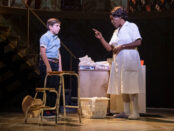N/A
Correa who for many years worked for Congresswoman Constance A. Morella knows his way around government and his characters are very convincing. The casting of Diane Paulus’ production is superb and Taylor and Villafañe make excellent sparring partners. The encounters which take place mainly in N’s congressional office that of first Minority Leader and then later Speaker of the House (the same set by Myung Hee Cho) include fast-paced repartee, quips, retorts and wordplay, all worth listening to. You are required to listen intently as the dialogue is fast paced and rapid fire. When we meet them A has just won her first primary in the Bronx and Queens, defeating the Democratic Party candidate that N has supported. In the course of the five scenes of the play, we next meet them when N needs A’s vote to regain the Speakership, while the last scene takes place four years later when the Republicans have regained the House and N is packing up her office, having stepped down from her position as party leader. [more]









